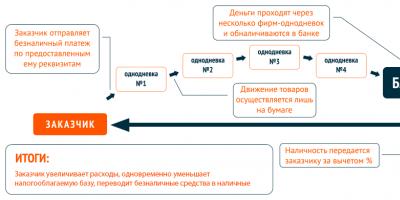Dolzhenko D. A.,
Leading Lawyer
LLC "Actual Management"
Who should wait for the exit
tax audit in 2017?
The risk of a tax audit can be minimized: do not interact with fly-by-night companies or intermediaries without economic benefit. But its possibility cannot be completely ruled out.
Traditionally, the risk zone includes those taxpayers who conduct high-risk businesses. Such risks are established in the order of the Federal Tax Service of Russia dated May 30, 2007 No. MM-3-06/333@ (as amended on May 10, 2012):
1. The tax burden of a given taxpayer is below its average level for business entities in a specific industry (type of economic activity).
2. Reflection in accounting or tax reporting of losses over several tax periods.
3. Reflection in tax reporting of significant amounts of tax deductions for a certain period.
4. The growth rate of expenses exceeds the growth rate of income from the sale of goods (works, services).
5. Payment of average monthly wages per employee below the average level for the type of economic activity in the constituent entity of the Russian Federation.
6. Repeatedly approaching the maximum value of the indicators established by the Tax Code of the Russian Federation that grant taxpayers the right to apply special tax regimes.
7. Reflection by an individual entrepreneur of the amount of expenses as close as possible to the amount of his income received for the calendar year.
8. Construction of financial and economic activities based on concluding agreements with counterparties-resellers or intermediaries (“chains of counterparties”) without reasonable economic or other reasons (business purpose).
9. Failure by the taxpayer to provide explanations to the notification of the tax authority about the identification of discrepancies in performance indicators, and (or) failure to provide the tax authority with the requested documents, and (or) the availability of information about their destruction, damage, etc.
10. Repeated deregistration and registration with the tax authorities of the taxpayer in connection with a change in location (“migration” between tax authorities).
11. Significant deviation of the level of profitability according to accounting data from the level of profitability for a given field of activity according to statistics.
12. Conducting financial and economic activities with high tax risk.
GOOD TO KNOW
The on-site inspection ends with the preparation of a certificate. After this, the inspectors will deregister the organization at the location of the closed branch (representative office) or other separate division.
When assessing tax risks that may be associated with the nature of relationships with certain counterparties, the taxpayer is recommended to examine the following signs:
- lack of personal contacts between the management (authorized officials) of the supplier company and the management (authorized officials) of the buyer company when discussing the terms of delivery, as well as when signing contracts;
- lack of documentary evidence of the authority of the head of the counterparty company, copies of his identity document;
- lack of documentary evidence of the authority of the counterparty's representative, copies of his identity document;
- lack of information about the actual location of the counterparty, as well as the location of warehouse and/or production and/or retail space;
- lack of information about the method of obtaining information about the counterparty (no advertising in the media, no recommendations from partners or other persons, no website of the counterparty, etc.). Moreover, the negativity of this attribute is aggravated by the presence of available information (for example, in the media, outdoor advertising, Internet sites, etc.) about other market participants (including manufacturers) of identical (similar) goods (works, services), including number of those offering their goods (works, services) at lower prices;
- lack of information about the state registration of the counterparty in the Unified State Register of Legal Entities (public access, official website of the Federal Tax Service of Russia www.n alog.ru).
Regarding the provision of explanations, attention should be paid to the amendments that were adopted in 2016. If, during a desk audit, the tax authority requests clarification from a person obliged to submit an electronic VAT return, they can only be sent in electronic form via the TKS. The format will be set by the Federal Tax Service. Explanations on paper will not be considered submitted. Consequently, if the taxpayer provides explanations by mail, they will not be considered received, and the tax authority may order an on-site tax audit.
GOOD TO KNOW
The taxpayer, within ten days from the expiration of the deadline for additional tax control measures, has the right to submit his written objections to the results of these measures.
There are also signs that tax authorities pay special attention to during the operation of a company:
1. The company is actively involved in foreign trade activities. At the same time, according to the presented financial statements, there is no movement and balance of money in the company’s current accounts or they are less than the cost of goods, or the statements are not submitted.
2. The company claims significant amounts of taxes for reimbursement.
3. The company often “loses” primary documents. At the same time, “lost” documents take a long time or are not restored at all.
4. The irregular nature of the company's business.
5. The company carries out isolated non-core operations.
6. The company uses non-standard means of payment (bill of exchange, barter, assignment of claims).
7. The company uses non-market prices or prices fluctuate greatly.
8. Lack of economic feasibility of the operation.
9. The company does not have the fixed assets necessary for its activities (transport, warehouse, retail outlets, etc.).
10. The taxpayer, after blocking his accounts in one bank, opened a new account in another bank.
11. The amount of transactions, information about which can be obtained from electronic books of purchases and sales and other external sources, exceeds sales revenue according to the company’s reporting data.
12. The sales amount according to the income tax return is less than the value of the same indicator according to the financial statements.
13. The company submits zero reporting if there is information about the purchase and sale of real estate, transport, the sale of alcohol, and the implementation of export-import operations.
Thus, in order to avoid a tax audit, it is advisable to exclude tax risk criteria.
Who determines the tax risk criteria?
Based on the results of the control work, the Federal Tax Service of Russia, taking into account the pre-trial settlement of disputes with taxpayers and established arbitration practice, determines the most common methods of conducting financial and economic activities with a high tax risk, aimed at obtaining unjustified tax benefits.
GOOD TO KNOW
Information on methods of conducting financial and economic activities with a high tax risk is posted on the official website of the Federal Tax Service of Russia www.nalog.ru in the section “Publicly available criteria for self-assessment of risks.”
What will radically change in on-site tax audits from 2017?
1. In 2017, the administration of insurance premiums is included in the scope of regulation of the tax authorities. However, they will check those contributions that have been accrued since 2017.
Tax authorities will conduct:
- desk checks of the correctness and validity of the insured's expenses for the payment of insurance coverage when considering the insured's request for the allocation of the necessary funds for the payment of insurance coverage;
- desk audits of the policyholder's expenses for the payment of insurance coverage, reflected in the calculation of insurance premiums submitted to the tax authorities;
- on-site inspections of the correctness of the policyholder's expenses for the payment of insurance coverage simultaneously with on-site inspections conducted by the tax authority on the correctness of calculation, completeness and timeliness of payment (transfer) of insurance premiums in accordance with the legislation of the Russian Federation on taxes and fees (Information of the Federal Insurance Service of the Russian Federation).
ORIGINAL SOURCE
By conducting a desk audit of the calculation of insurance premiums, the inspectorate will be able to request from the legal entity information and documents that confirm the validity of reflecting amounts not subject to contributions, as well as information and documents that confirm the validity of the application of reduced contribution rates.
2. Inspectors will be able to charge additional contributions if the deductions for them are less than personal income tax. Therefore, companies that have significant discrepancies in the bases for personal income tax and insurance premiums will fall into the risk zone.
3. In 2017, inspectors, within the framework of one on-site tax audit, will be able to check all types of fiscal payments established by the Tax Code of the Russian Federation (including insurance premiums), and, accordingly, make additional assessments on them.
4. From July 1, 2016, the inspector is not authorized to request documents that he can receive from other government agencies.
5. From 2017, the tax authority will also inspect foreign Internet companies that provide services for legal entities and individuals. Such companies will have to register for tax purposes and file returns, and therefore the tax authority will be able to conduct on-site and desk audits.
What are tax authorities looking for?
Traditionally, tax authorities check taxpayer transactions for unjustified tax benefits.
A tax benefit is understood as a reduction in the amount of tax liability due, in particular, to a reduction in the tax base, receipt of a tax deduction, tax benefit, application of a lower tax rate, as well as obtaining the right to a refund (offset) or reimbursement of tax from the budget.
A tax benefit may be considered unjustified, in particular, in cases where, for tax purposes, transactions are taken into account not in accordance with their actual economic meaning or transactions are taken into account that are not due to reasonable economic or other reasons (business purposes).
Here is a diagram of an unjustified tax benefit.
Unjustified tax benefit received

The unfoundedness of a tax benefit may also be evidenced by evidence-based arguments of the tax authority regarding the presence of the following circumstances:
- the impossibility of the taxpayer actually carrying out these operations, taking into account the time, location of property or the volume of material resources economically necessary for the production of goods, performance of work or provision of services;
- lack of necessary conditions for achieving the results of the relevant economic activity due to the lack of managerial or technical personnel, fixed assets, production assets, warehouses, vehicles;
- accounting for tax purposes only those business transactions that are directly related to the emergence of a tax benefit, if this type of activity also requires the completion and accounting of other business transactions;
- carrying out transactions with goods that were not produced or could not be produced in the amount indicated by the taxpayer in the accounting documents.
GOOD TO KNOW
The Federal Tax Service will expectedly try to identify possible facts of dishonesty of the parties to the transaction and, having identified such facts, control prices and determine the amount of unjustified tax benefits received by taxpayers.
EXAMPLE FROM JUDICIAL PRACTICE
Tax authorities may identify a lack of actual services provided and work performed. As an example, we can cite the Ruling of the Supreme Court of the Russian Federation dated October 10, 2016 No. 309-KG16-10785. In this decision, the court found that relations with disputed counterparties were used by the applicant only as additional links in the sequence of actions, the purpose of which was to obtain an unjustified tax benefit in the form of a VAT refund and acceptance of income tax expenses. Evidence of the actual provision of services and performance of work by these contractors is not confirmed either by documents or by control measures. Another example of an unjustified tax benefit is reflected in the resolution of the Arbitration Court of the East Siberian District dated September 21, 2016 No. F02-4850/2016. The court found that the documents submitted by the company contained false information, and the concerted actions of the company and its counterparties were aimed at obtaining unjustified tax benefits; and besides, failure to comply with the proposal does not entail legal consequences for society, since it does not contain authoritative, administrative, mandatory instructions.
GOOD TO KNOW
Low profitability as an audit risk is not at all 100% evidence of the unclean intentions of company leaders. It may be due, for example, to marketing policy.
As part of unjustified tax benefits, the Federal Tax Service checks relationships with fly-by-night companies. Connections with fly-by-night companies are proven by the presence of signs of risks that are established in the concept of on-site tax audits.
EXAMPLE FROM JUDICIAL PRACTICE
In the resolution of the Ninth Arbitration Court of Appeal dated March 4, 2016 No. 09AP-2367/2016, the court came to the conclusion that there were connections with fly-by-night companies. According to the bank statement for the current accounts of Primera LLC, it was established that Primera LLC made transfers for transport services to organizations that have the characteristics of “fly-by-night” companies (there are no labor personnel, the managers are “massive”), namely: LLC “ Prostor", LLC "Expoline", LLC "Doris". From the Internal Affairs Directorate for the Central Administrative District of the Main Directorate of the Ministry of Internal Affairs of Russia for the city of Moscow, the tax authority received explanations from the General Director of Investproject LLC S.V. Klyueva, who reported that she was not involved in the activities of Investproject LLC, this organization was not familiar to her, in the period 2010–2012 . she worked at the Perekrestok store as a salesperson, and also indicated that in 2008 she lost her passport. In this regard, she wrote a statement to the internal affairs authorities. Some time later I found my passport in the mailbox. S.V. Klyueva also explained that she had never conducted any activities on behalf of legal entities.
GOOD TO KNOW
An important criterion for determining the feasibility of including a taxpayer in the on-site tax audit plan is profitability. It is clear that the higher this profitability indicator, the more effective the organization’s activities. The obtained data are compared with the average indicators for the taxpayer’s main activity. A significant downward deviation is considered to be 10% from the industry average.
A similar connection with fly-by-night companies was revealed in the resolution of the Ninth Arbitration Court of Appeal dated March 20, 2014 No. 09AP-5428/14. The tax authority indicates that the taxpayer and CJSC "UK ZHKH Monolit" are interdependent entities, and the relationship between them was built with the aim of obtaining unjustified tax benefits and withdrawing funds through "fly-by-night" companies. At the same time, only two grounds are indicated for recognizing the taxpayer as interdependent with his counterparty: the taxpayer, in the opinion of the interested party, is subordinate to the State Institution “Information System of the Novokosino District”, the head of which was Vladimir Andreevich Dukman, who owns 36% of the shares of ZAO “UK ZHKH Monolit”, and employees of DEZ Abdikeeva Elena Aleksandrovna and Lomakina Tatyana Stepanovna, each owned shares of 5% of the shares of ZAO UK Housing and Communal Services Monolit.
In addition, in practice, tax authorities are looking for opportunities to charge additional taxes by calculation. This is possible if, for example, the taxpayer does not submit documents for tax control. In the ruling of the Supreme Court of the Russian Federation dated January 25, 2016 No. 302-KG15-17939, the court refused to challenge the decision of the Federal Tax Service. Limited Liability Company "VostSibNeft" applied to the court to challenge the inspectorate's decision regarding the additional assessment of corporate income tax in the amount of 1,438,350 rubles, value added tax in the amount of 50,551,506 rubles, the accrual of penalties on these taxes in total in the amount of 16,787,759 rubles. 28 kopecks, bringing to justice under paragraph 1 of Art. 122 of the Tax Code in the form of a fine in the total amount of 4,288,131 rubles. 93 kop. The Supreme Court put an end to it, pointing out the guilt of the applicant himself, who did not submit primary and other documents to verify the correctness of calculation and timely payment of taxes. Therefore, in the court’s opinion, the additional tax assessment is lawful.
Thus, very often the tax authority is looking for an unjustified tax benefit. Evidence may vary:
- transactions with related parties;
- lack of documents;
- registration at the mass registration address, mass founder and general director;
- working with fly-by-night companies that are not located at a legal address, etc.
GOOD TO KNOW
As for the industry average workload and profitability, then, in fact, these criteria represent a flirtatious fig leaf covering... What exactly can be found out by reading the correspondence of participants in the on-site audits section of the forum of tax officials, where they are in a relaxed informal atmosphere and not especially shy in expressions, they discuss their difficult lot.
Moratorium on inspections - one year has passed
In 2015, the topic of establishing a moratorium on inspections was actively discussed. Many expected relaxations in terms of tax audits. But today it is clear that these expectations were not justified.
Firstly, The moratorium on audits did not in general affect tax audits. And judicial practice suggests that audits of companies are carried out and additional taxes and fees are assessed to companies and entrepreneurs.
Secondly, Many small businesses are simply afraid to use the moratorium mechanism. The fact is that it is necessary to write an application for exclusion from inspections, that is, the moratorium does not apply automatically. A legal entity or individual entrepreneur has the right to submit to the state control (supervision) body, municipal control body an application to exclude an inspection against them from the annual plan for conducting scheduled inspections if they believe that the inspection is included in the annual plan for conducting scheduled inspections in violation of the provisions of this article. The procedure for filing an application, the list of documents attached to it confirming the classification of a legal entity or individual entrepreneur as a small business entity, the procedure for considering this application, appealing the inclusion of an inspection in the annual plan for scheduled inspections, as well as the exclusion of the corresponding inspection from the annual plan for conducting scheduled inspections are determined by the Government Russian Federation. And many companies and entrepreneurs are afraid that this will raise additional questions from inspectors. Since small businesses are not automatically excluded from the inspection plan, many companies and entrepreneurs do not know how to apply this mechanism and how to reduce the risks of tax audits.
Third, The moratorium on scheduled inspections has not been extended to legal entities and individual entrepreneurs operating in the social sphere, as well as in the areas of healthcare, education, heat supply, electricity, energy saving and increasing energy efficiency. In relation to these persons, scheduled inspections may be carried out two or more times within three years.
In this regard, many companies and entrepreneurs did not feel the effect of the moratorium, did not understand that they were more protected by the state and could calmly survive the crisis in the economy.
In conclusion, it should be noted that the risks of tax audits will not decrease in 2017. It is also necessary to be prepared for changes, to independently monitor and verify the counterparties with whom contracts are concluded. What other recommendations can you give? It is necessary to more thoroughly check counterparties, as well as monitor “high-profile cases” to assess tax risks.
What inspectors will look for during a tax audit in 2017. A checklist that will help you prepare for business audits.
The priority directions of the tax policy of the Russian Federation for 2016 and the planning period of 2017 and 2018 are to prevent an increase in the tax burden and to simultaneously increase tax revenues to the budget. In this regard, tax audits will not only become less frequent - they will be comprehensive and meticulous. Moreover, inspectors now have even more tools for collecting reasons for carrying them out. So, what will tax authorities be looking for in 2017?
What will people pay attention to during a tax audit?
Registration and registration in funds
The first thing they check during a tax audit is whether all enterprises are registered. If stamps, forms, or forms of non-existent companies are used, this will be qualified under Article 171 of the Criminal Code of the Russian Federation as “Illegal entrepreneurship”, the maximum penalty is 5 years in prison. From January 1, 2017, the Federal Tax Service of Russia takes over the functions of monitoring the correctness of calculation and timely payment of insurance contributions to the Pension Fund of the Russian Federation, the Social Insurance Fund and the Federal Compulsory Medical Insurance Fund. Now such control will be carried out according to the general rules for conducting tax audits and regulated by the Tax Code of the Russian Federation. But periods that expired before 2017 will be checked according to the old rules by the Pension Fund of the Russian Federation and the Federal Social Insurance Fund of the Russian Federation. As part of on-site inspections, tax officials will check both the payment of taxes and insurance premiums. It is expected that insurance premium collections will increase due to the transfer of such powers to the Federal Tax Service, since tax authorities have long developed a methodology for collecting arrears, including through intimidation (see. how to prepare for a tax audit ).
"Left" companies
During a tax audit in 2017, there are risks of applying Articles 173.1 “Illegal formation (creation, reorganization) of a legal entity” and 173.2 “Illegal use of documents for the formation (creation, reorganization) of a legal entity” of the Criminal Code of the Russian Federation. The maximum penalty under 173.1 is up to 5 years in prison.
Signs of cashing out through shell companies
Legality of wages, taxes and contributions from them
A difficult violation to prove. Since when resolving cases of payment of envelope salaries to employees in court, arbitrators take into account only specific amounts of “gray” salaries, from which additional contributions can be calculated. If an employee says that his employer once paid him about 3,000 rubles. cash, then such testimony will not be accepted in court. However, the auditors will try to bring the company to justice under Article 199.1 of the Criminal Code “Failure to fulfill the duty of a tax agent” with up to 6 years of imprisonment and, of course, arrears, penalties, and fines.
Illegal unlicensed programs
A favorite topic of operatives and investigators during tax audits in 2017. Article 146 of the Criminal Code - up to 6 years with a fine of half a million.
How to prepare for the 2017 tax audit. Checklist
I advise businessmen to independently assess the risks of holding their company liable before the audit begins.
The minimum checklist should contain:
- Check the presence of folders and documents in them using the following blocks:
- bank documents;
- cash documents;
- contracts;
- personnel documents;
- general documents (constituent documents, rent, utilities, others);
- documents for fixed assets and intangible assets;
- Books and magazines.
- Take all bank statements.
- Take any bank statement for any day.
- Take any transaction shown on your bank statement.
- Request all documents for this operation. Go through the entire chain of movement of documents and money related to this operation: agreement, invoice, invoice, delivery notes, sales receipts, and so on - look at absolutely all the primary documents along this chain.
- If this was an operation for the purchase of office equipment, check the physical presence of office equipment, passports for it, invoices or sales receipts, invoices, invoices, commissioning certificates, accounting entries, depreciation, and so on.
- Then check the statements. I recommend checking your reporting to the state for the last three years.
- Make sure that the reports are physically available, that they are connected to each other, and that there are documents confirming payments to the state.
- Check other documents: move around the office from one workplace to another, take the first document on the table, ask: “what is this?”, “Where should it be?”, and have the employee name it, put it in its place or throw it away trash can if not needed.
- Write down all the shortcomings so that you can later create a program to eliminate them. Additionally, invite an experienced accountant (not an auditor, there are reasons for this) and let him check the reporting and maintenance of registers.
Be sure to check that each enterprise (IP) you use in business meets the criteria of integrity and independence. Collect a basic package of documents to confirm the verification of the counterparty: request copies of constituent documents, passports of the company's top officials, seal impressions and sample signatures, etc.
After conducting a legal diagnosis of the company, you will be ready for a real tax audit in 2017 and at any time.
14.12.2016
Tax audits in 2017
Tax audits 2017: changes, new rules
New rules for tax audits 2017: what are the changes?
The Federal Tax Service of Russia published on nalog.ru the “Tax Passport” of each region and statistics on arrears of companies in the country as a whole. Debts have risen like never before in recent years. Because of this, tax officials have been tasked with quickly reducing the amount of debt of companies. They will attack from all sides.
Let's figure out what tax audits will be like in 2017, what changes and new rules you should prepare for.
Desk and field tax audits in 2017
Tax audits in 2017 will be more dangerous - inspectors are trying to charge more and more not only during on-site audits, but also during desk audits. During all inspections, special attention will be paid to transactions with one-day transactions. This is reported by the tax specialists we interviewed. The company will be asked for explanations or documents regarding such transactions. And some inspections immediately require that expenses and deductions be removed if the counterparty is listed in the one-day database. There are still new trends in the upcoming inspections.
Frequent cameras. Inspectors now conduct in-depth cameras 20 percent more often than a year ago. This means that the likelihood that you will be required to provide explanations or documents for an in-depth audit and larger additional charges than before is also increasing. Thus, over the year the average price of one effective camera has increased sharply - up to 58 thousand rubles. This is 39 percent more than last year (RUB 41,700). Tax officials report that charges have increased due to VAT cameras - the Federal Tax Service program now automatically detects discrepancies between the supplier and the buyer. At the same time, the share of effective camera cameras is still stagnant - 5 percent.
Expensive on-site inspections. Every year, inspectors come to companies less and less often - in the nine months of 2016, tax officials inspected 17,362 organizations, and a year ago - 19,749. But almost no one manages to avoid claims - 99.3 percent of on-site inspections, as before, end additional charges. The average price of an on-site inspection increased by almost half - by 45 percent. According to data for the nine months of 2016, it amounts to 14,605,000 rubles, and a year ago the tax authorities charged much less - 10,044,000 rubles. But the price may vary in your region. For example, in Moscow it is 41.6 million rubles, in St. Petersburg - 71.8 million rubles, and in the Krasnodar Territory - 4.9 million rubles.
All this suggests that tax authorities are planning audits even more precisely. Tax audits in 2017 will not be an exception. Changes and new rules allow you to select potential violators using the ASK VAT-2 system. In 2017, tax officials will plan on-site audits primarily based on gaps that the program has identified in VAT returns.
In 2017, tax officials are also planning comprehensive audits of interdependent companies. That is, they want to check the entire group of such organizations at once. This way, inspectors will be able to analyze transactions between dependent counterparties and identify business fragmentation, including those carried out with the aim of remaining on a simplified basis.
But the most dangerous checks are still those carried out by tax authorities together with the police. Over the nine months of 2016, tax officials conducted 4,623 joint audits. The cost of the audit was RUB 25,428,000. This is 20 percent more than in 2015.
You can see the average price of on-site and desk inspections in your region in the table (below).
New contribution checks. Tax officials will check contributions. But inspectors will not start with on-site inspections. First, the work will be carried out using the same methods as for personal income tax (letter of the Federal Tax Service of Russia dated October 20, 2016 No. ZN-18-1/1103). That is, tax officials will begin to request explanations about low wages, call to salary commissions, and include in the inspection plan those companies that are suspected of understating the base for personal income tax and contributions.
On-site inspections of the Federal Tax Service for 2017: plan and schedule of inspections
Unlike other departments (for example, foundations), tax inspectors do not publish a plan and schedule of inspections for the coming year.
You can find out about non-tax audits on the website of the Prosecutor General's Office. In a special form you need to indicate basic information about (company OGRN, INN, name), and the service will show who, when and how often will check. The schedule for 2017 should appear soon.
Collection of tax debts in 2017
How tax debts have grown. According to official statistics from the Federal Tax Service of Russia on all major taxes - profit, VAT, personal income tax - the budget received an average of 5 percent more money than last year. A drop in payments was recorded only for mineral extraction tax, and the amount of property taxes decreased very slightly (by 2%). But at the same time, tax debts of companies are growing in all regions of the country. It turns out that this year companies paid more than a year ago, but at the same time they still owed more to the budget than last year.
According to the website nalog.ru, from January 1 to September 1, 2016, the debt increased by 16 percent. Over the past five years, such a sharp jump has never happened. Therefore, in all regions, tax authorities have begun enhanced measures to collect arrears. This will be especially felt by companies in Moscow, the Moscow region, St. Petersburg, the Kabardino-Balkarian Republic and the Krasnodar Territory - the largest debts are here.
How the Federal Tax Service will collect debts. Firstly, the company will be called to a debt commission. Many companies, even before the commission or immediately after it, transfer part of the debt to the budget in order to convince the tax authorities of their good faith. You can also agree with the tax authorities on a schedule for gradual payment of debts. Secondly, they will withdraw from bank accounts. Including if, after the commission, the tax authorities do not receive results. If there is not enough money in the account, debts will be collected from the property. Thirdly, they will try to collect debts from the new company if the business has been transferred to it. Or personally from the director, if the company became bankrupt as a result of large debts.
And fourthly, clarification will be required. Previously, inspectors often asked the company to submit an amendment and reduce the amount of tax to the one it actually paid, so that there were no debts. Now the service management prohibits such manipulation with clarifications. Therefore, such local requirements are not often possible. But regarding 6-NDFL they will ask for clarification. This year, according to inspectors, personal income tax debts have increased due to errors in 6-personal income tax. Arrears and penalties can be removed by clarification.
Advice
See the safe tax burden by industry in your region on the Federal Tax Service website nalog.ru in the section “Statistics and Analytics” > “Tax Analytics” > “Tax Passports”
Combating losses and low tax burden in 2017
Strengthening the work of unprofitable commissions is also one of the main tasks for tax authorities at the end of this year and at the beginning of 2017. We learned about this from a letter from one regional Federal Tax Service. Moreover, at the commissions, inspectors will process not only unprofitable companies, but also those whose tax amounts payable are lower than the industry average for the region. If they call you, they will demand that you submit an update on your profit for nine months and remove the loss. And in the declaration for 2016, reflect the amount of tax payable that is close to the safe indicator of the tax burden in your region.
It’s safer to go to the inspectorate and explain how you plan to get out of an unprofitable or low-profit situation. A low load can be justified by the fact that sales have decreased, expenses have increased, etc.
If you ignore the call to the commission, there is a risk of an on-site inspection and enhanced camera surveillance. And during inspections they will deal with the loss more thoroughly. This is evidenced by the statistics of the Federal Tax Service. Thus, based on the results of 9 months of 2016, tax authorities withheld losses of 50 billion rubles from commissions. less than during checks. And during inspections they reduced losses by a total of 358.8 billion rubles. - this is twice as much as in the same period last year (RUB 179.4 billion).
Important!
How else do you deal with losses?
From January 1, the rules for transferring losses to the future will change. Now companies have the right to write off losses from previous years without restrictions on the amount. Starting from 2017, it will be possible to take into account losses amounting to no more than 50 percent of the tax base of the current period. This limitation is introduced for all losses that have arisen since 2007. For example, as of January 1, 2017, the company has an unwritten loss of RUB 700,000. The tax base (profit) for the first quarter of 2017 is 500,000 rubles. Therefore, in the first quarter of 2017, a loss in the amount of RUB 250,000 can be taken into account. (RUB 500,000 × 50%). The remaining 450,000 rubles. (700,000 – 250,000) the company will transfer to the following periods.
If a company made a loss at the end of the reporting period, then losses from previous years cannot be written off. They can be taken into account only when profit appears. And no more than 50 percent of the tax base
How much does the Federal Tax Service extra charge for inspections (data for 9 months of 2016)
|
Select your subject of the Russian Federation |
Average price of a camera camera (RUB) |
Average price of on-site inspection (RUB) |
|
Central Federal District |
||
|
Moscow |
||
|
Belgorod region |
||
|
Bryansk region |
||
|
Vladimir region |
||
|
Voronezh region |
||
|
Ivanovo region |
||
|
Kaluga region |
||
|
Kostroma region |
||
|
Kursk region |
||
|
Lipetsk region |
||
|
Moscow region |
||
|
Oryol Region |
||
|
Ryazan Oblast |
||
|
Smolensk region |
||
|
Tambov Region |
||
|
Tver region |
||
|
Tula region |
||
|
Yaroslavl region |
||
|
Northwestern Federal District |
||
|
Saint Petersburg |
||
|
Republic of Karelia |
||
|
Komi Republic |
||
|
Arkhangelsk region and Nenets Autonomous Okrug |
||
|
Vologda Region |
||
|
Kaliningrad region |
||
|
Leningrad region |
||
|
Murmansk region |
||
|
Novgorod region |
||
|
Pskov region |
||
|
North Caucasus Federal District |
||
|
The Republic of Dagestan |
||
|
The Republic of Ingushetia |
||
|
Kabardino-Balkarian Republic |
||
|
Karachay-Cherkess Republic |
||
|
Republic of North Ossetia-Alania |
||
|
Chechen Republic |
||
|
Stavropol region |
||
|
Southern Federal District |
||
|
Republic of Adygea |
||
|
Republic of Kalmykia |
||
|
Republic of Crimea |
||
|
Krasnodar region |
||
|
Astrakhan region |
||
|
Volgograd region |
||
|
Rostov region |
||
|
Sevastopol |
||
|
Volga Federal District |
||
|
Republic of Bashkortostan |
||
|
Mari El Republic |
||
|
The Republic of Mordovia |
||
|
Republic of Tatarstan |
||
|
Udmurt republic |
||
|
Chuvash Republic |
||
|
Kirov region |
||
|
Nizhny Novgorod Region |
||
|
Orenburg region |
||
|
Penza region |
||
|
Perm region |
||
|
Samara Region |
||
|
Saratov region |
||
|
Ulyanovsk region |
||
|
Ural federal district |
||
|
Kurgan region |
||
|
Sverdlovsk region |
||
|
Tyumen region |
||
|
Chelyabinsk region |
||
|
Khanty-Mansiysk Autonomous Okrug-Yugra |
||
|
Yamalo-Nenets Autonomous Okrug |
||
|
Siberian Federal District |
||
|
Altai Republic |
||
|
The Republic of Buryatia |
||
|
Tyva Republic |
||
|
The Republic of Khakassia |
||
|
Altai region |
||
|
Krasnoyarsk region |
||
|
Irkutsk region |
||
|
Kemerovo region |
||
|
Novosibirsk region |
||
|
Omsk region |
||
|
Tomsk region |
||
|
Transbaikal region |
||
|
Far Eastern Federal District |
||
|
The Republic of Sakha (Yakutia) |
||
|
Primorsky Krai |
||
|
Khabarovsk region |
||
|
Amur region |
||
|
Kamchatka Krai |
||
|
Magadan Region |
||
|
Sakhalin region |
||
|
Jewish Autonomous Region |
||
|
Chukotka Autonomous Okrug |
||
For an entrepreneur, tax audits often cause concern. However, any other too, but all businessmen pay close attention to the tax office, which is understandable. As usual, they are divided into planned and unscheduled
For what reason can a scheduled tax audit be carried out?
The procedure for conducting scheduled audits is regulated by Order of the Federal Tax Service of Russia No. MM-3-06/333 dated May 30, 2007, which approved a unified concept for the planning system for on-site tax audits. As it says, “to improve taxpayer literacy, strengthen discipline, and improve the work of tax authorities.” The main principles of the Concept are:
1. The audit planning system is uniform for tax authorities.
2. It must be clear and accessible to taxpayers. To independently assess the risks of being included in the tax audit plan, the taxpayer can familiarize himself with the publicly available criteria that are used by tax authorities to select companies when conducting on-site tax audits. There are 12 of them in total.
3. Most favored nation treatment for conscientious payers.
4. If signs of a possible violation of the legislation on taxes and fees are detected, the response is timely.
5. Punishment of unscrupulous taxpayers, if violations of the legislation on taxes and fees are found, is inevitable.
6. The selection of objects that were included in the tax inspection plan (for 2017 and beyond) is justified.
How to find out about a scheduled tax audit?
In what case is a taxpayer most likely to be included in the Federal Tax Service's on-site inspection plan for 2017? This is likely provided that the company meets the risk criteria. If you have concerns that your company could be included in the schedule of tax audits for 2017, read the criteria that are given in Appendix No. 2 to the order of the Federal Tax Service of Russia No. MM-3-06/333 dated May 30, 2007, carefully.
There is a high probability of being included in the tax inspection plan for 2017 if:
- Over several tax periods, the organization reports losses;
- The company reflects large amounts of tax deductions in tax reporting;
- A company may be subject to tax audits if the average monthly salary of company employees is below the average level (the salary amount is compared with salaries for a given economic type in the region);
- The faster growth rate of expenses than the growth rate of income from the sale of goods (works, services);
- Taxpayers who have repeatedly been close to the indicators that give them the right to apply the special regime have a great chance to be included in the plan for on-site tax audits for 2017;
- The company enters into contracts with intermediaries and resellers without having justified reasons for this;
- On-site tax audits in 2017 may affect your company if you have not provided the inspection with the required documents or explanations of any inconsistencies in the activities of your company. Perhaps the tax office has information that some documents in your company were destroyed;
- The reason why an on-site inspection by the Federal Tax Service may be carried out in your company in 2017 may be repeated “migration” between tax inspectorates - that is, a regular change of location.
Tax audits in 2017, list of organizations
Some taxpayers are confident that information about on-site tax audits is freely available and published on the Internet. To some extent, the right to think this way is given to them by the already familiar register of inspections of the Prosecutor General’s Office on control measures of other departments. The tax inspection schedule for 2017 cannot be found in the unified register of inspections published on the official website of the Prosecutor General's Office of the Russian Federation.
This register does not concern tax officials. Yes, and it is impossible to enter the query “tax audits in 2017, list of organizations” into a search engine and reliably check whether your company should prepare for an audit by the tax inspectorate. There is no list of tax inspections for 2017.
Both unscheduled and scheduled tax audits for 2017 are carried out without prior familiarization with them to the general public.
Only certain enterprises can learn about the schedule of tax audits. Before December 31, a list of scheduled tax audits for 2017 was published on the official website of the Federal Tax Service. But it does not apply to all companies, but only to legal entities engaged in state-regulated activities.








